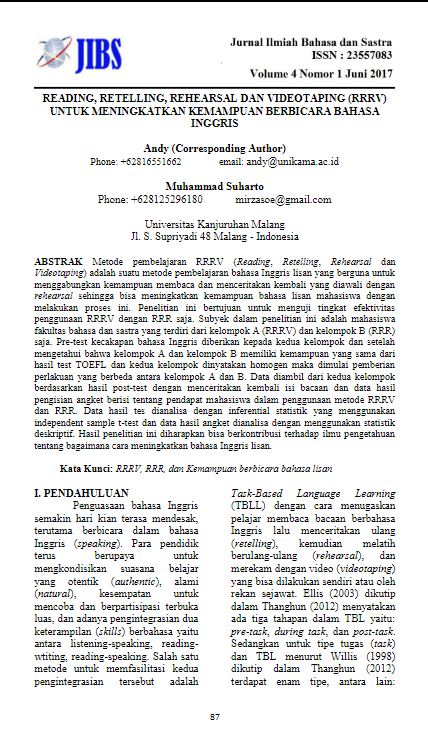READING, RETELLING, REHEARSAL AND VIDEOTAPING (RRRV) TO IMPROVE SPEAKING ABILITY IN ENGLISH
Isi Artikel Utama
Abstrak
RRRV (Reading, Retelling, Rehearsal, and Videotaping) learning method is a verbal English learning method which is useful to combine reading ability and retelling a story preceeded by doing rehearsal and therefore students’ verbal competence can be increased during this process. This research aims to test the effectiveness in applying RRRV to merely RRR without V. The subjects are students at faculty of language and literature consisting of group A (RRRV) and group B (RRR) only. Pre-test of English proficiency is given to group A and group B before treatment is presented to both of them. The result of the test is used to ascertain whether the goups are homogenous in terms of their English proficiency. It shows that both group A and B have equal ability in TOEFL test result, thus both groups are considered to be homogenous and hence different treatment are given to group A and B. After treatments, data is taken from both groups based on post-test result by retelling the content of story and including video-taping for group A and audio-taping for group B. Meanwhile, data is taken from questionnaire consists of students’ opinion in applying RRRV and RRR method. Data from the test is stored in SPSS version 22 and inferential statistics of independent sample t-test analysis is used to examine if there is significant difference between the use of RRRV and RRR only. The result of questionnaire is analysed using descriptive statistics. Hopefully, the resulf of this research is able to contribute to the body of knowledge about how to improve verbal English proficiency.
Rincian Artikel
JIBS (Jurnal Ilmiah Bahasa dan Sastra) allows readers to read, download, copy, distribute, print, search, or link to the full texts of its articles and allow readers to use them for any other lawful purpose. The journal allows the author(s) to hold the copyright without restrictions. Finally, the journal allows the author(s) to retain publishing rights without restrictions

This work is licensed under a Creative Commons Attribution-ShareAlike 2.0 Generic License.
Referensi
Harris, D. P. (1969). Testing English as a Second Language. New York.
McGraw-Hill, Inc. Katchen, J.E. 1992. Using the Video Camera to Improve Speaking and Performance Skills. Papers from the eight conference on English language teaching and learning in the Republic of China (pp. 531-540)
Krashen, S. (2013). Second Language Acquisition: Theroy, Applications, and Some Conjectures. Cambridge. CambridgeUniversity Press.
Larsen-Freeman. (2000). Techniques and Principles in Language Teaching. Oxford: OxfordUniversity Press.
Mart,Çağrı Tuğrul. (2012). Developing Speaking Skills through Reading. International Journal o-f English Linguistics.2(6). at URL: http://dx.doi.org/10.5539/ijel.v2n6p91
Mombeini,S.,Gorjian,B.,&Pazhakh,A. (2013). The Role of Encoding and Rehearsal Strategiesin Developing EFL Learners’ Vocabulary Recalland Retention. International Journal of Language Learning and Applied Linguistics World(IJLLALW), Volume4(4),283-302.
Muzammil, L., &Andy, A. (2017). Teaching Proficiency through Reading and Storytelling (TPRS) as a Technique to Foster Students’ Speaking Skill. JEELS, 4(1), 19-36.
Richards, J.C. and Renandya, W.A. (2002). Methodology in Language Teaching: An Anthologyof Current Practice. Cambridge: Cambridge University Press.
Rog, L. J. (2003). Guided Reading Basics. Pembroke.
Thanghun, K. (2012). Using of Task-Based Learning to Develop English Speaking Ability of Prathom 6 Students at Piboonprachasan School. Thesis Unpublished. Srinakharinwirot University.
Willis, J. (1996). A Framework for Task-Based Learning. Harlow: Longman.
Zhang, Y. (2009). Reading to Speak: Integrating Oral Communication Skills.
English Teaching Forum, 2009(1),32-34.Retrieved from http://dx.doi.org/10.1061/41052(346)25

